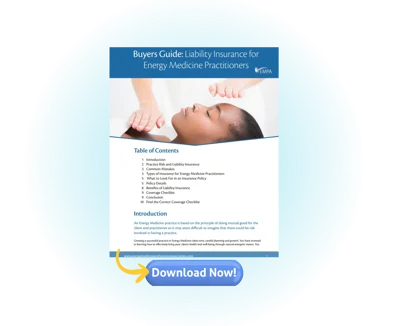7 Essential Business Practices that Healing Schools Should Teach
November 24th, 2025
5 min read
By Anya Charles

You’re learning how to help people heal; what an exciting chapter of your life! The energy work, the intuitive skill-building, the sense of purpose that comes with it - your modality training is a wonderful part of the practitioner’s journey.
Here’s something to consider as you pursue your education: many training programs are focused on skill and technique; not necessarily on how to be a safe, professional business owner.
We’ve worked with thousands of energy healing students and practitioners, and many only realize what they weren’t taught after something goes wrong—a complaint, a misunderstanding, or a claim that puts their reputation at risk.
This article walks you through some key safety practices your school should be teaching you—but might not be. These are the foundation of a sustainable, trustworthy, and sound practice. Whether you’re already seeing clients or just starting out, this guide will help you train smarter and more confidently from the start.
 1. Ethics and Professional Conduct
1. Ethics and Professional Conduct
Every healing session starts with trust. But trust doesn’t just come from intuition—it comes from professional behavior and connection that puts your client’s safety and well-being first.
Your organization should be teaching you clear ethical standards: things like confidentiality, respectful communication, appropriate touch (if relevant to your modality), and what to do if a client becomes emotionally overwhelmed.
Ethics aren’t optional. It's what separates a hobbyist from a practitioner, where clients feel secure.
And here’s something some students aren’t told: your ethical conduct is foundational to your success. Clients can sense when something feels off — and they’ll walk away. Practicing ethically not only protects your integrity, but it also builds the kind of reputation that keeps your practice strong over time.
💡 Curious why ethics really matter? Our blog breaks down what happens when energy healers skip the standards: What Happens When Energy Healers Don’t Follow Their Code of Ethics.
2. Signed Informed Consent
Informed consent is often treated like a checkbox: hand over a form, get a signature, move on.
Real consent is a conversation, not a form.
Learning to create and use a written consent form that clearly explains what clients are agreeing to before a session begins is an important skill to gain while training. This includes what the session involves, how long it will last, your policies, and what clients can expect after the session.
A signed consent is often paired with a scope of practice (more on that below!) statement. These protect both you and your client. It shows that expectations were made clear, boundaries were respected, and participation was voluntary.
Keep in mind that if there’s ever a misunderstanding or complaint, having this document can make a big difference.
💡 If your program hasn’t introduced informed consent yet, it’s not too early to start learning about it. At EMPA, our members have access to templates and resources to help create forms and documents that fit your budding practice.
3. Understanding Scope of Practice
Knowing where your role begins—and ends—is a crucial part of practicing safely.
Just as important as developing your healing technique is understanding the legal and professional boundaries that come with offering any type of healing service.
Scope of practice defines what you're allowed to do based on your training and credentials. It also helps you avoid accidentally stepping into territory reserved for licensed professionals, like doctors, therapists, or nutritionists.
You also need to be aware of state or regional laws that may apply to your modality—especially around physical touch. In some areas, even light or clothed touch may be regulated, depending on the type of service you offer. Make sure you know the rules that apply to your work and where to find credible guidance if you're unsure.
You need to know:
- What counts as crossing a line
- When a client’s concern is outside your expertise
- How to refer someone appropriately without overstepping
This knowledge doesn’t just protect you, but also allows trust to flow more comfortably. Clients feel reassured when you’re clear about what you offer, and you’ll feel more confident knowing you’re staying on solid ground.
4. Words Energy Healers Should Avoid in Marketing & Sessions
The words you use to describe your work matter! Not just from a marketing perspective, but as part of your safe practices checklist, too.
Certain terms, even when used casually, can trigger trouble if they imply you’re offering medical or psychological treatment without a license. Words like “heal,” “treat,” “diagnose,” or “cure” are protected and reserved for licensed professionals.
Even the word “heal,” (for example, stating that a session with you can heal an ailment) is that word that should not be used.
This can feel limiting at first, particularly if those words might reflect how you genuinely view your work. Rest assured that using clear, appropriate language doesn’t dilute your practice…it protects it.
You may consider phrases like:
- Support clients in their healing process
- Work with the energy body to promote balance
- Offer sessions to support overall well-being
Getting comfortable with this kind of language early on helps you avoid misunderstandings and build a reputation as someone who takes their role seriously. If you're ever unsure, it's better to err on the side of clarity and caution—and cross reference with a professional familiar with your local and state laws.
💡Not all titles are fair game. Find out why calling yourself a “therapist” could land you in trouble—read: Why Energy Healers Shouldn’t Use the Title “Therapist” Without a License.
5. Business Basics Every Energy Healing Student Should Know
Sure, you don’t need to be a business expert to start practicing, but you do need a few foundational skills!
Even if your training focuses mostly on the healing itself, it’s worth learning how to manage things like:
- Clear communication and policies (cancellations, late arrivals, follow-ups)
- Client intake forms and documentation
- Boundaries around session time and availability
- Basic recordkeeping for tax and legal purposes
These might sound like small details, but they create the structure that keeps your practice running smoothly while reducing friction in functionality.
6. Energy Healing Liability Insurance (Yes, Even as a Student)
It’s easy to assume insurance is something you’ll think about after you graduate. Well, here’s the reality: if you’re seeing clients, offering case studies, or even giving sessions to friends while training—you’re already exposed to risk.
Liability insurance isn’t just for full-time professionals. Many student policies may cover practice hours, informal sessions, and public events. It’s a simple step that protects you from claims related to harm, misunderstandings, or accidents—things that could potentially put you out of practice before you’ve even started.
💡Not sure what kind of coverage you need while you’re still training? Download our free guide: "Buyer's Guide to Liability Insurance for Energy Medicine Practitioners”—it breaks it all down in plain language, so you can make an informed choice.
7. Advocate for Yourself as an Energy Practitioner
Not every training program will cover all the safety practices you need—and that’s okay. What matters is that you know how to fill in the gaps.
As a student, it can be tempting to assume your organization will give you everything. But every program has its strengths, and many focus heavily on technique while overlooking business, ethics, or liability guidance.
That’s not a failure on their part; it just means you need to take initiative.
Advocating for yourself might look like:
- Asking questions about scope, consent, and documentation during training
- Seeking outside resources (like EMPA’s guides and community!)
- Taking short courses on ethics or risk management alongside your modality training
No one else is more invested in your future practice than you are. When you take ownership of your education, you lay the foundation for a career that’s not only fulfilling, but resilient.
What’s Next: Safety Starts Now
You’re preparing to serve real people in the real world. That calls for more than intuition and skill. It requires structure and a commitment to protecting both yourself and those you support.
Ethics, consent, scope of practice, documentation, and insurance may not be the most exciting parts of your training, but they are the pillars that hold up a long-term, trustworthy practice. Learning these now will likely mean fewer mistakes later—and a smoother path as you grow.
At EMPA, we believe that education and protection go hand-in-hand. That’s why we offer guidance and coverage tailored for energy healing students like you. If you're ready to take the next step, start with clarity. Download our free guide: “The Energy Healer’s Buyer’s Guide to Liability Insurance.” It’s a simple, jargon-free resource designed to help students like you understand what coverage you need—and why it matters—so you can move forward with confidence.
Disclaimer: This article is for educational purposes only and does not provide legal, financial, or medical advice. The examples are general, and coverage may vary by policy. Always refer to your insurance provider or policy language for specific details, as the policy terms take precedence. For legal concerns related to your practice, consult an attorney.
Anya is a writer with a passion for inspiring those around her. She is the Content Manager at EMPA, where she works closely with subject matter experts to turn their insight into articles that inform, support, and empower the energy healing community. With over a decade of experience in the wellness world, she enjoys making complex ideas feel accessible and meaningful. Whether she’s writing new pieces or polishing others, Anya’s focus is on helping others grow their clarity and professionalism. She also serves as Editor in Chief of Energy Magazine, a unique publication dedicated to the world of energy medicine. Outside the office, you’ll find Anya reading, planning travel adventures, or negotiating peace treaties with her houseplants.
Topics:

.png?width=1326&height=405&name=EMPALogo_final_white-01%20(1).png)
.png?width=195&height=204&name=7%20Essential%20Business%20Practices%20that%20Healing%20Schools%20Should%20Teach%20(1).png)
.png?width=195&height=205&name=7%20Essential%20Business%20Practices%20that%20Healing%20Schools%20Should%20Teach%20(2).png)
.png?width=195&height=205&name=7%20Essential%20Business%20Practices%20that%20Healing%20Schools%20Should%20Teach%20(3).png)
.png?width=195&height=206&name=7%20Essential%20Business%20Practices%20that%20Healing%20Schools%20Should%20Teach%20(4).png)
.png?width=195&height=203&name=7%20Essential%20Business%20Practices%20that%20Healing%20Schools%20Should%20Teach%20(5).png)

.png?width=195&height=204&name=7%20Essential%20Business%20Practices%20that%20Healing%20Schools%20Should%20Teach%20(8).png)
.png?width=253&height=250&name=7%20Essential%20Business%20Practices%20that%20Healing%20Schools%20Should%20Teach%20(6).png)
























